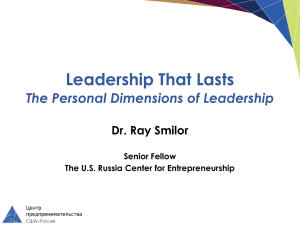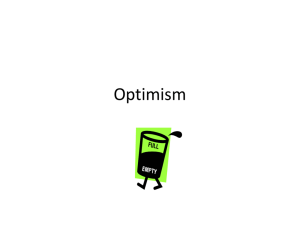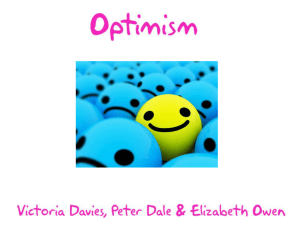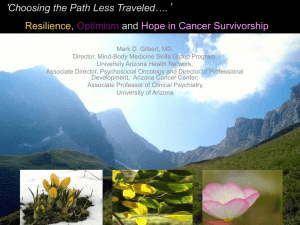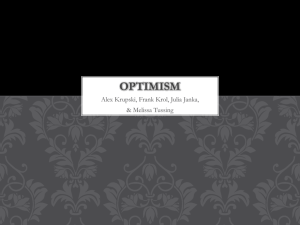University of Edinburgh Postgraduate Journal of Culture and the Arts
advertisement
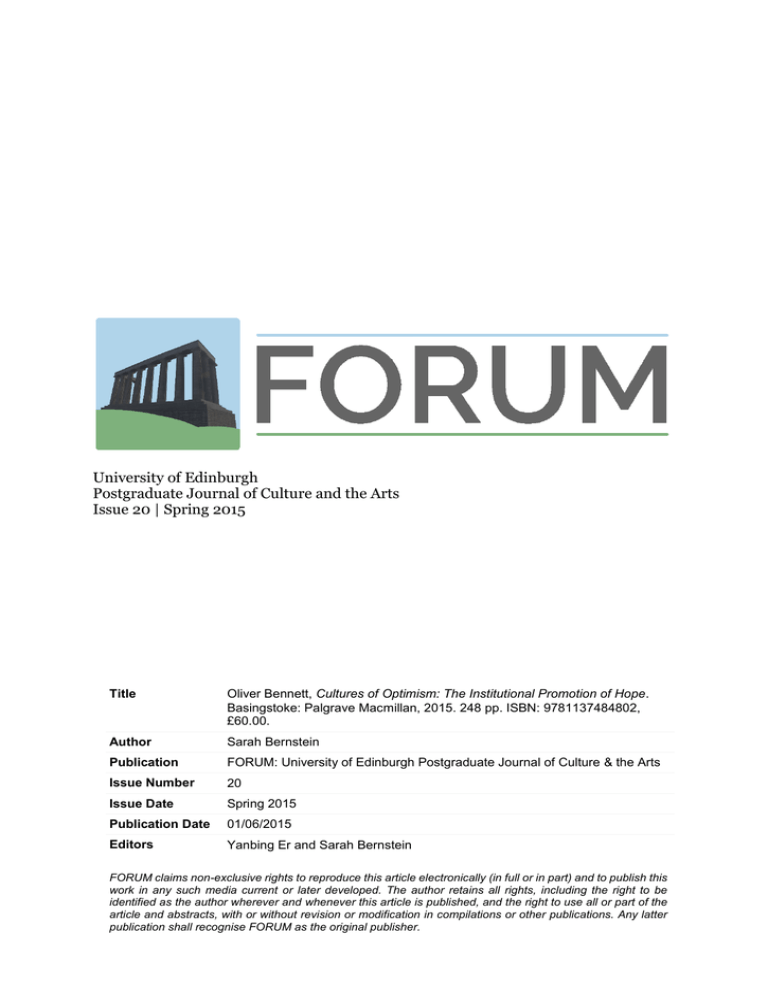
University of Edinburgh Postgraduate Journal of Culture and the Arts Issue 20 | Spring 2015 Title Oliver Bennett, Cultures of Optimism: The Institutional Promotion of Hope. Basingstoke: Palgrave Macmillan, 2015. 248 pp. ISBN: 9781137484802, £60.00. Author Sarah Bernstein Publication FORUM: University of Edinburgh Postgraduate Journal of Culture & the Arts Issue Number 20 Issue Date Spring 2015 Publication Date 01/06/2015 Editors Yanbing Er and Sarah Bernstein FORUM claims non-exclusive rights to reproduce this article electronically (in full or in part) and to publish this work in any such media current or later developed. The author retains all rights, including the right to be identified as the author wherever and whenever this article is published, and the right to use all or part of the article and abstracts, with or without revision or modification in compilations or other publications. Any latter publication shall recognise FORUM as the original publisher. FORUM | ISSUE 20 Sarah Bernstein 1 Oliver Bennett, Cultures of Optimism: The Institutional Promotion of Hope. Basingstoke: Palgrave Macmillan, 2015. 248 pp. ISBN: 9781137484802, £60.00. Sarah Bernstein University of Edinburgh Optimism, writes Oliver Bennett, “cannot be escaped”; everyone retains some form of it. In his new study, Cultures of Optimism: The Institutional Promotion of Hope, Bennett explores how institutions like democratic politics, the workplace, family, religion, and psychotherapy promote and reproduce “cultures” of optimism. What these at times divergent “cultures” have in common is a “shared ‘form’ of positive expectation” (6). Cultures of Optimism opens with a discussion of Enlightenment optimism and its displacement by the intellectual pessimism of the twentieth century. Sociology, Bennett argues, played a significant role in the dismantling of Enlightenment optimism, particularly the writing of Max Weber and Frankfurt School thinkers; on the other hand, narratives of decline can be found in fields as various as ecology, human rights, and military history, particularly after the 1960s. In fact, the “pessimism of the intellect” is endemic now, according to Bennett, but it also coexists with a mode of viewing the future he calls an “optimism of everyday life”, a form of expectation that things will turn out all right in the end (10). In this section, Bennett includes an impressively wide-ranging review of literature on optimism, focusing in particular on social and evolutionary psychology that view optimism as a biological necessity. He writes in summary that the specific functions optimism performs, together with new evidence of its biological aspects, “point to what can be termed ‘the optimism imperative’” (24). The subsequent chapters provide case studies of the precise ways in which optimism functions and is reproduced in the five social institutions. In his discussion of hope and democratic politics, for instance, Bennett supplies extensive examples of political speeches (“rhetorical optimism”), campaign promises, and explores the ways the very concept of democracy – in all its manifestations – is inextricably linked to optimistic thinking. Later chapters follow along similar lines, opening with brief historical sketches of human relations, parenting, religion, and psychotherapy, and move on to discuss the ways in which they are and have been implicated with hope and optimism and with their reproduction and transmission. The breadth of research Cultures of Optimism draws on is impressive, and the study deftly synthesises the salient points in organised, readable chapters that elucidate the institutional promotion of optimism through these various contexts. Bennett writes in the introduction that he conceives of his study as a lifting of the veil on how cultures of optimism are promoted through institutional action rather than as an attack on the ideology of optimism itself. And the chapters set out, in a detailed and direct way, just how this works, covering a spectrum of theoretical approaches and conscientiously presenting examples of existing and possible critiques of the institutional mobilisation of optimism. What there is space for in Cultures of Optimism is a further examination of the implications of the institutional propagation of hope and optimism. Without necessarily mounting an attack on the ideology of optimism per se, the study might have gone FORUM | ISSUE 20 Sarah Bernstein 2 further in examining how the form of optimism changes once it has been deployed by institutions, and, particularly, what effect this has on people for whom optimism, performs such crucial work “that societies cannot live without it” (2). What, for instance, might it mean that our relationship to optimism is an “imperative” one? The study concludes that the social reproduction of optimism is so widespread, “propagating imagined futures that reflect the different kinds of hope and multiplicity of values and desires”, that it suggests not only the existence of diverse cultures of optimism, but an “over-arching culture of optimism” (171, 173). Bennett argues compellingly here that such widespread promotion of optimism can be understood as a form of cultural policy, “as a phenomenon that holds together changing political orders across place and time”, but the study does not press this point, concluding that the “optimism imperative” is a cultural universal, a sign of the “manifest compulsion of human beings to invest hope in the future” (173, 174). Cultures of Optimism is an important study that has laid the groundwork for future analysis on hope and optimism in cultural studies and is sure to inspire further work in these areas. FORUM | ISSUE 20 Sarah Bernstein 3 Author Biography Sarah Bernstein is a PhD candidate in English Literature at the University of Edinburgh. Her research focuses on post-war writing by women and its engagement with the social sciences and the British Welfare State. Other research interests include detective fiction, the Frankfurt School, theories of everyday life, nature writing and ecocritical theory. She is co-editor of FORUM from January-December 2015.
